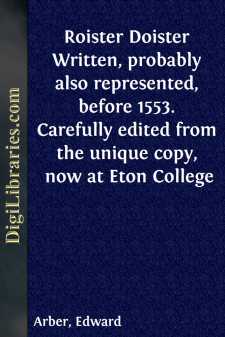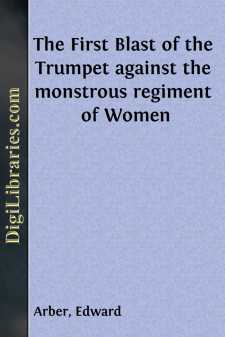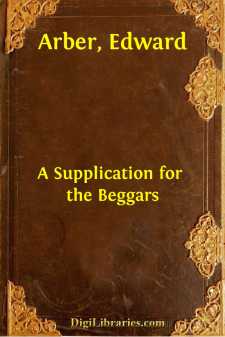Categories
- Antiques & Collectibles 13
- Architecture 36
- Art 48
- Bibles 22
- Biography & Autobiography 813
- Body, Mind & Spirit 141
- Business & Economics 28
- Children's Books 12
- Children's Fiction 9
- Computers 4
- Cooking 94
- Crafts & Hobbies 4
- Drama 346
- Education 46
- Family & Relationships 57
- Fiction 11826
- Games 19
- Gardening 17
- Health & Fitness 34
- History 1377
- House & Home 1
- Humor 147
- Juvenile Fiction 1873
- Juvenile Nonfiction 202
- Language Arts & Disciplines 88
- Law 16
- Literary Collections 686
- Literary Criticism 179
- Mathematics 13
- Medical 41
- Music 40
- Nature 179
- Non-Classifiable 1768
- Performing Arts 7
- Periodicals 1453
- Philosophy 64
- Photography 2
- Poetry 896
- Political Science 203
- Psychology 42
- Reference 154
- Religion 513
- Science 126
- Self-Help 83
- Social Science 81
- Sports & Recreation 34
- Study Aids 3
- Technology & Engineering 59
- Transportation 23
- Travel 463
- True Crime 29
Roister Doister Written, probably also represented, before 1553. Carefully edited from the unique copy, now at Eton College
by: Edward Arber
Categories:
Description:
Excerpt
INTRODUCTION.
HE author and early date of the present Comedy are ascertained by a quotation in Sir Thomas Wilson’s Rule of Reason of Roister Doister’s letter to Dame Custance.
The first edition of the Rule of Reason, 1550-1, is a very scarce work; of which I have been unable to see a copy. The second edition, 1552, 8vo, ‘newely corrected by Thomas Wilson,’ has not the quotation: which apparently first appears in the third edition of 1553, 4to, the title of which runs, “The Rule of Reason, conteinyng the Arte of Logique. Sette furthe in Englishe, and newly corrected by Thomas Wilson. Anno Domini. M.D.LIII. Mense Ianuarij.”
At folio 66 of this edition, Wilson, in treating of The Ambiguitie, adds to his previous examples, Roister Doister’s letter, with the following heading:
¶ An example of soche doubtful writing, whiche by reason of
poincting maie haue double sense, and contrarie
meaning, taken out of an entrelude
made by Nicolas Vdal.
The present comedy was therefore undoubtedly written before the close of the reign of Edward VI., who died 6 July 1553.
If it was then printed, that entire edition has perished. The prayer for the Queen at p. 86, can be for no other than Queen Elizabeth: and therefore, although the title-page is wanting and there is no conclusive allusion in the play, it may confidently be believed that the extant text was printed in Elizabeth’s reign: and that it had possibly in some respects been modified.
There now comes the evidence of the Stationers Co.’s Register, as quoted by Mr. Collier, Extracts, i. 154, Ed. 1848:
Rd of Thomas Hackett, for hys lycense for pryntinge of a play intituled auf Ruyster Duster, &c. iiijd
The missing title-page and the absence of any colophon in the Eton copy, here reprinted, preclude demonstrative proof that it is one of Hackett’s edition. It is however morally certain that it does represent that text.
On the whole, therefore, though that text was posthumous— Udall having died in Dec. 1556—: and though its authorship rests entirely on the above heading of Wilson’s quotation: it may be safely accepted that Udall is the author of this comedy, and that he wrote it before 1553. Conclusions both of them consonant with the known facts of Udall’s life.
The comedy was probably first written for the Eton boys to act. Mr. W. D. Cooper thus writes:—
Certain, however, it is that it was the custom of Eton, about the feast of St. Andrew, for the Master to choose some Latin stage-play for the boys to act in the following Christmas holidays, and that he might sometimes order smart and witty English plays. “Among the writings of Udall about the year 1540,” says Warton, “are recited Plures Comediæ, and a tragedy De Papatu, on the Papacy, written probably to be acted by his scholars;” and it is equally probable that the English comedy was written with a like object; for it is admirably adapted to be a good acting play, and the author avows in the prologue that his models were Plautus and Terence, with whose writings his scholars were familiar....




